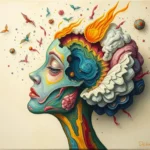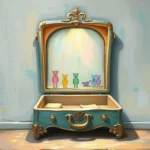Dreams have long fascinated humanity, serving as a window into our subconscious minds. They can reveal our deepest fears, desires, and unresolved conflicts, often using vivid imagery and symbolism. Understanding dreams, especially those that emerge in adulthood, can provide valuable insights into our emotional and psychological landscape. Adult dreams are particularly intriguing as they often reflect complex issues stemming from personal experiences, relationships, and societal pressures. In this article, we will delve into the intricate world of adult dreams, exploring their symbolism, meanings, and real-life connections.
Symbolism and Meaning
When we talk about adult dreams, we often encounter a rich tapestry of symbols that can vary greatly from person to person. However, certain symbols tend to recur across different dreamers. Let’s explore some of these common symbols and their interpretations.
One prevalent symbol is nakedness. Dreaming of being naked, especially in public, can signify feelings of vulnerability or exposure. It might indicate that you fear judgment from others or feel unprepared for a situation in your waking life. Alternatively, it can suggest a desire for authenticity, a wish to shed societal expectations and embrace your true self.
Another common symbol is falling. This often represents a loss of control or fear of failure. The sensation of falling can evoke feelings of anxiety, suggesting that you may be grappling with insecurities in your life. Conversely, falling can also symbolize a release of burdens. If you experience a sense of freedom while falling, it may point to a desire to let go of responsibilities or constraints.
Death is yet another significant symbol that can appear in adult dreams. While it may seem alarming, dreaming of death often signifies transformation or change rather than literal mortality. It can indicate the end of a particular phase in your life and the beginning of a new one. This transformation can be related to relationships, careers, or personal growth, urging you to embrace the changes that come your way.
Chase dreams, where you find yourself being pursued, are also common among adults. These dreams often highlight feelings of anxiety or stress in your waking life. The identity of the pursuer can provide clues about the source of your stress. If you are being chased by a person from your past, it may signify unresolved issues or past traumas that need addressing. On the other hand, if the pursuer is an unknown figure, it might represent a general sense of anxiety or an aspect of yourself that you are trying to escape.
These symbols can have different meanings based on personal experiences and cultural backgrounds. For instance, water in dreams can symbolize emotions and the subconscious. Clear water may represent clarity and peace, while turbulent water can signify emotional turmoil. Reflecting on your feelings towards these symbols can help you connect them more deeply to your unique life circumstances.
Key Scenarios and Variations
The context of a dream plays a crucial role in its interpretation. Different scenarios featuring common symbols can lead to vastly different meanings. Let’s explore some variations of adult dreams and how they can alter the interpretation.
Imagine a dream scenario where you are running a race. This dream could symbolize a desire for achievement or competition. However, if you are struggling to keep up or feel you are falling behind, it may reflect feelings of inadequacy or pressure to succeed in your waking life. Conversely, if you feel empowered and confident during the race, it could signify your drive and determination to reach your goals.
Another variation could involve driving a car. This dream often symbolizes control over your life’s direction. If you are driving smoothly, it suggests you feel in control and confident in your decisions. However, if you are lost or unable to steer, it could indicate feelings of uncertainty about your path or a lack of direction in life. The presence of other passengers can also add layers to this interpretation. Are they supportive, or do they seem disinterested? Their behavior can reflect your feelings about relationships and support systems in your waking life.
Being in a house is also a common scenario that carries significant symbolism. The state of the house can reflect your mental state. A cluttered or dilapidated house may indicate inner turmoil or unresolved issues, while a well-maintained home might signify stability and comfort. Exploring different rooms in the house can further delve into various aspects of your life. For example, discovering a hidden room could symbolize uncovering aspects of your personality or memories you have repressed.
These variations highlight the importance of considering the entire context of your dream, including the emotions you felt during the dream and the specific details that stood out. Reflecting on these elements can deepen your understanding of the underlying messages your subconscious is trying to convey.
Real-Life Connections and Takeaways
Understanding the symbolism and variations of adult dreams can empower you to connect these nocturnal experiences to your waking life. The insights gained from dream interpretation can serve as a catalyst for self-reflection and personal growth.
For instance, if you frequently dream of being chased, take a moment to evaluate the stressors in your life. Are there unresolved issues or situations you’re avoiding? This recognition can encourage you to confront these challenges head-on, potentially alleviating the anxiety that fuels such dreams. Acknowledge your feelings and consider seeking support from friends or professionals if needed.
Dreams about falling can also offer valuable lessons. If you often experience anxiety related to failure, it may be beneficial to reassess your goals and expectations. Are they realistic, or are you setting yourself up for disappointment? Embracing the idea that failure is a part of growth can transform your approach to challenges, allowing you to take calculated risks without the paralyzing fear of falling.
Additionally, dreams of transformation, such as death, can inspire you to embrace change in your life. Reflect on areas where you feel stagnant and consider how you can initiate change. This might involve pursuing a new career, ending a toxic relationship, or simply adopting a healthier lifestyle. Recognizing that change is a natural part of life can empower you to take proactive steps towards your well-being.
Lastly, keep a dream journal to track your dreams and their meanings over time. Writing down your dreams shortly after waking can help you recall details that may fade throughout the day. Regularly reviewing your entries can reveal patterns, recurring symbols, and themes that resonate with your emotional state. This practice can deepen your understanding of your subconscious mind and provide ongoing insights into your waking life.
In conclusion, dreams are a powerful tool for self-discovery and reflection in adulthood. By exploring the symbols, scenarios, and real-life connections associated with dreams, you can uncover profound insights that promote personal growth. Each dream is an invitation to delve deeper into your psyche, offering opportunities to confront fears, embrace change, and ultimately lead a more fulfilling life. Take a moment to reflect on your recent dreams, and consider what messages your subconscious might be sending you.







